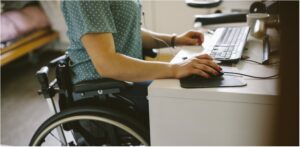5 Lessons I Needed to Learn About Job Searching as a Disabled Person was originally published on The Muse by Esme Mazzeo. Please click here to read the article in full.
In an article from The Muse, Esme Mazzeo shares 5 lessons she learned about job searching with a disability:
“1. Accept That You Can’t Plan a Perfect Career Path
My disability has made me a decent planner. I have no choice. Concert tickets that take abled people just a few clicks to buy can take disabled people days depending on how many steps are involved. (It recently took me over 48 hours, multiple phone calls, and a whole lot of stress to get wheelchair accessible seats to a Sara Bareilles show.)
So planning exactly what I thought my career should look like made sense to me. Education provides you with a neat path if you’re lucky. Elementary school to middle school, middle school to high school, high school to college and beyond. The paths are clear and safe. Access and accommodations can’t be denied by law. But the real world is different. I quickly learned that the road is full of bumps and detours—both good and bad. This may be common knowledge for some people, but no one tells you that when you’re on the sidelines watching everyone else.
After college, I used a vocational service I qualified for, thinking they would help me begin a career. Instead, I ended up at a bookstore with a manager who was unwilling to help me succeed, working a retail job when I was hoping to get a little bit closer to the publishing world. Like I said, I’ve always wanted to write. But I was scared to pursue it because I convinced myself the field was too competitive.
Though I already had an undergraduate degree in publishing, more school felt like a start. After getting my master’s, I had plenty of time to dream while I waited out the period when my income was restricted. I wanted to become the editor-in-chief of my own magazine, write a teleplay, run my own show, land a staff writer position. But every goal seemed too big. Meanwhile, even entry-level jobs paid enough that I’d be risking my qualification in programs that were helping me.
Everywhere I turned, despite all my planning, all I could see and fixate on were roadblocks: my lack of a driver’s license, my wheelchair, my being “behind” compared to my peers. My thoughts kept spinning around and around. Eventually, my anxiety became so debilitating that I was able to admit to my therapist that I needed medication. The change didn’t happen overnight, but my anxiety slowly lifted and I started to feel hopeful about my future. I could finally break down my goals into manageable, actionable steps.
2. Take the Step Right in Front of You
Underneath all of my anxiety, I’d had this one idea: to pose for a photoshoot and write an essay about it in a project designed to increase my confidence. As a whole, it was a huge undertaking. But the new me was able to start small, ask for advice, and complete each step in turn.
The whole experience opened up doors for me that I didn’t even know existed. I’d ask someone for help and they’d lead me to a Facebook group where I would meet the next person who had the next answer I needed—even if I didn’t know I needed it. I ended up with a published essay I was proud of and a wealth of other ideas about what I wanted to write next. I still had a lot to learn about the freelancing process, but I had resources now, and my medication helped my ideas become manageable.
None of that would’ve happened if I hadn’t forced myself to literally stop. Stop planning and dreaming and spiraling. Sometimes, dreams and plans for the future don’t matter as much as meeting yourself exactly where you are in the moment. Then you can begin to see the opportunities or obstacles that exist right in front of you. When you overcome one, you take on the next one, and on and on until you begin to see tangible accomplishments. Trust me, it feels great.
3. Know When to Ask for Help…”
Visit The Muse for more great tips and advice on disability in the job search.

